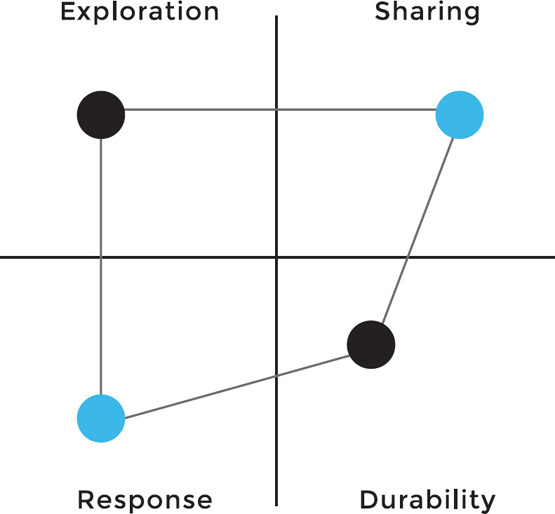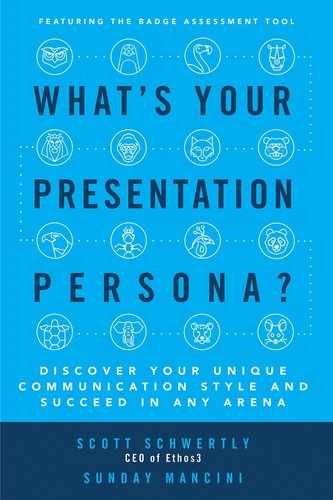Chapter 10
THE EDUCATOR
MEET THE EDUCATOR
Educators are represented by the strong elephant, which traditionally signifies intelligence and an imposing demeanor. This is because Educators put a lot of hard work into the preparation of their message, and they are imposing figures onstage with their authoritative style. They impress their audience with their wit as well as their scope of knowledge, making them thorough presenters who know the task at hand and crush expectations beneath their jumbo-size elephant feet.
When Educators walk onstage, they convey that they’re in charge through nonverbal cues. They state their main points plainly, and they take care to explain any unfamiliar vocabulary or jargon that the audience may encounter. If members of their audience have questions, they are fully capable of handling even the most uncomfortable or off-the-wall inquiry. Organized, powerful, and clear—that’s the Educator style.
If you received this profile, you already have everything you need to become a solid presenter. This could be due to past experience, but it may also be because you are dedicated and single-minded when it comes to challenges in business and in your personal life. You scored well in the quadrants in which a thorough knowledge of your audience and subject matter is required, and this is also reflected in your natural range.
The only foe that Educators face is the longevity of their message. This may be because the content you deliver is itself limited. Maybe you’re a math teacher who shares the building blocks only to the next lesson, or perhaps you are a salesperson specializing in one-time purchases of big-ticket items, such as air-conditioning units. It can be hard to see how your subject matter could be used on a bigger platform or how it could change the world. Perhaps you struggle with the fact that your words have immediate value only for your audience.
But there is good news! Educators can always adapt. What if you found ways to become a part of your audience’s life, even if your message is short term? What if you created a platform for your single-use product, becoming the expert in your niche market? With a little bit of vision, your persona can become the ruler of the savannah.
HOW YOU SCORED
So how did you score the Educator? These results were calculated using our four-quadrant algorithm in which anything on the outside corner of the specific quadrant is considered high and anything near the main intersection is considered mid-low (Figure 10.1). Here is a simple rundown of your placement in each quadrant and how we arrived at your profile:
EXPLORATION
When you hear words such as “preparation,” “additional materials,” and “rehearsing,” a bell most likely goes off in your head. Educators score on the high end of this quadrant because they know what it takes to prepare for a talk. You’re not afraid to put in the extra work and long hours to edit your presentation, create good-looking slides, and work through your content until it feels just right. However, getting ready for a talk is more than just a formula that you repeat over and over again. Sometimes a pinch of creativity can help break you out of a low Durability score (see below) and give your normal talk a boost of long-term memorability.

Figure 10.1 The Educator
SHARING
Educators score well in this quadrant, and we suspect it’s because of all of that wonderful prep work. Even if you still suffer from a few pre-speech jitters, your audience doesn’t intimidate you enough for you to make mistakes or lose sight of your ultimate goal. Educators are skilled at using examples, nonverbal cues, and even a dash of humor to keep audiences engaged and yes, even awake. For most presenters, the “awake” part is especially difficult.
RESPONSE
Because Educators often live in a world of short-term messages and long discussions, they score well in the Response quadrant. You might already have seen the benefit of group activities and Q&As throughout your career, and you know how helpful they can be in personalizing your message for different learners. Educators often come equipped with the observational skills to help them gauge audience response and act accordingly. Think of teachers who want to help their students pass the SATs. They hope that some of the larger concepts are remembered, but in general, they do a great job ensuring that the short-term formulas and facts stick for the time being.
DURABILITY
This is the only quadrant in which Educators score in the mid- to low range. Is it because you are limited by short-term messages? Or is it because you haven’t considered creating a larger platform for yourself and your message? Either way, the long-term value and the length of time your message is relevant are questionable. Going back to that teacher comparison, consider the limitation of a lesson that is remembered only until the test. In this case, they may find creative ways to tie specific parts of the lesson to their students’ lives, or they may perhaps build a platform for themselves that helps their message grow outside of the classroom.
SPOTTING AN EDUCATOR IN THE WILD
Meet Shelly, a Renaissance history professor at a local community college. She’s been teaching for 10 years and loves her job, driven by a passion for all things Renaissance. With each new class of students, she can’t wait to share her excitement and play an entire album of period-appropriate harp music.
Shelly is a realist and knows that many of her students are attending her class for credit, not necessarily because they love the Renaissance. But with each new student, she hopes to instill a bit of excitement that will carry on throughout the rest of his or her life. Since her town hosts a Renaissance fair each year, Shelly would love to see former students participate in costume and indulge in giant turkey legs.
Everyone’s favorite history teacher faces a few challenges. The test format at the community college is rigorous, so her students need to remember a lot of facts and dates rather than just enjoying the literature and her engaging storytelling. She also knows that most people would rather be in creative writing workshops or at lunch, in spite of her best efforts. Sometimes a long list of kings and queens puts students to sleep faster than a lullaby played on a lute.
How can this Educator improve her own speaking style in order for her message to achieve longevity? Will she ever be able to convince her students to wear corsets and stockings to a Renaissance fair?
To be a success, Shelly needs to examine her prep work and some of the larger issues surrounding her course. If she usually teaches the Renaissance class in the winter semester but the fair is in early summer, she might consider switching the course to the spring. This way, the reward for passing the tests can be a group trip to the fair itself. She may also work on ways to make the course more interactive in general, with activities meant to simulate the Renaissance experience, such as a cooking class. Her work will take place in Exploration, which will in turn help her score in Durability.
The more she considers long-term benefits, the easier it will be for her to develop lessons and activities that will stick for her students. Shelly can feel inspired by this new perspective, thinking of her class as a Renaissance experience rather than just a few history credits for her students. Even if some of her audience will forget everything on the first day of summer break, not all of them will. Shelly can feel confident that she is putting in the work to become a more memorable speaker.
An ideal Educator doesn’t have to be discouraged by a less-than-ideal message. There is always a fresh way to make the topic not only more interesting to speak about but also much more fun and memorable to the audience. Think of the best class you’ve ever had in your life: how did that particular Educator stand out?
YOUR NATURAL HABITAT
Educators are comfortable taking the stage in most environments, from a classroom to a large conference room and beyond. But perhaps the place they are most comfortable is in a small group setting, which allows Educators to show off their knack for group activities and discussion.
While you may prefer a smaller crowd of people looking to be educated on a particular topic, you have the ability and drive to present to a concert hall filled with people. Don’t underestimate the number of people who would be interested in and engaged by your message. Consider some habitats that may be a little outside of your comfort zone, such as a podcast or a webinar for remote learners.
BRAWN (STRENGTHS)
Skillful
Effective
Dedicated
Educators don’t have to be told how to present; they have enough experience and passion for their subject matter to do an excellent job on their own. Even in their personal lives, they approach tasks mindfully and with their full energy. This is indicated by their high score in Exploration, which indicates a great dose of dedication right from the start.
Your score also indicates that you are familiar with important preparation techniques such as storyboarding your content, rehearsing out loud, and restricting your on-slide text to the information that matters. Because of this, you come across as a knowledgeable presenter who won’t waste your audience’s time.
TRAPS (WEAKNESSES)
Limited
Changeable
Tedious
Because they are typically asked to provide educational or professional content, Educators often limit themselves with the notion that they are not able to expand to a longer-term message. If you have the ability, you should use it. Consider broadening your skills by speaking about a topic you love in a venue outside of work.
Educators also risk overwhelming their audience with too much information, especially if it’s short term and not high level. Be sure you always tie your message to a big-picture takeaway for your audience so that their memory of your message will persist.
YOUR NATURAL ALLY
Want to learn ways to improve Durability? Take a lesson from Soldiers (Chapter 17) and observe how they develop long-lasting messages for their audience.
YOUR PREY
Students, lifelong learners, and those who are curious to uncover something new will love your presentation style. Anyone who also recognizes the thorough work you put into research will be impressed. You will appeal to most introverts because you deliver messages that require deeper thought to unpack. You also appeal to most extroverts because of your keen ability to manage participation activities that offer them value.
YOUR PREDATORS
Some people approach a presentation or talk with a “What’s in it for me?” mindset. Make sure to demonstrate how the subject you’re explaining directly relates to their day-to-day lives. You have the natural speaking ability to win them over.
FIVE DOS AND DON’TS
DOS
1. Approach your message with a lens toward the long term. How can your message affect your audience a month after your talk? How about a year? Aim to stretch its value and give your audience something more weighty.
2. The most crucial question for Educators to ask themselves is, “How does my message benefit my audience?” A presentation doesn’t have to be merely informative. It can serve a dual purpose as a catalyst to change hearts and minds.
3. Use storytelling to demonstrate how your main points fit into the lives of your audience members.
4. When your talk is finished, always provide the audience with clear next steps to experience fully the benefit of your message.
5. Have you ever considered expanding your platform? Your style would be well served by supplemental ways to spread the word, such as social media, webinars, and regular blogging.
DON’TS
1. Don’t guess what your audience would like to hear or should hear. Put in the time during the research phase to learn more about their needs.
2. Don’t underestimate the value of originality. Even if you must deliver a message that’s conservative, adding fresh design elements and unexpected content can boost its memorability.
3. Don’t overwhelm your audience with a lot of information and then leave them with a vague call to action that sounds like, “Remember all of that.” Edit your main points to a much more digestible level.
4. Don’t forget to empower your audience with the information, motivation, and inspiration they need to take your key concepts with them out into the world.
5. Don’t avoid technology. Use social media, new design software, and digital sharing to help your message reach more people. They don’t bite!
THE IDEAL EDUCATOR
There is no such thing as a bad persona. There are only areas to improve on within your range of strengths and weaknesses. With that in mind, what do ideal Educators look like?
1. They look beyond the limitation of their content, and they come up with creative methods to help extend its longevity with continued contact with their audience.
2. They realize the importance of revving up excitement with their audience, and they find fresh ways to do so with props, visual media, and meaningful interactive activities.
3. They use their preparation time not merely to rehearse and research their message but also to develop a platform for themselves as a presenter, which will last beyond the talk.
Let’s revisit the tale of Shelly, our Renaissance-loving teacher who wants to instill a passion for that era within her students. What happens when she follows our tips and thinks outside the box? Here’s what she tackles:
1. She shifts her goal beyond the date when the course ends, moving the semester in which it is taught to the semester in which the Renaissance fair is actually held, thereby encouraging her students’ participation in the fair.
2. She uses real-life activities such as bread making and weaving to get her students physically involved with the course material.
3. She starts her own Renaissance podcast to reach history buffs around the world, beyond her small community college.
Sometimes, all it takes for an Educator to become his or her ideal self is a new perspective. Step back from the message that you need to deliver and look around. Is there a way to give yourself longevity as a presenter even if your message lasts only for a short while? How do you turn your short-term message into a much more durable, long-lasting topic? As a mighty elephant, you are an incredibly prepared and confident presenter. You have the strength to become an ideal Educator.


